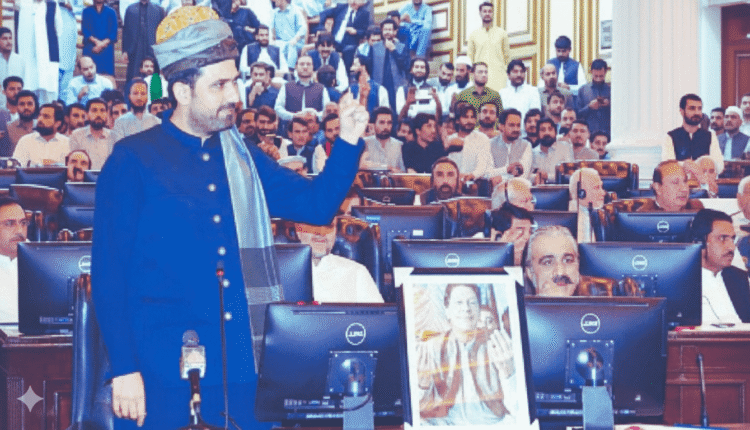Situationer: KP faces a constitutional crisis
A leadership crisis in KP over who is the rightful chief minister of the province.
KP Assembly – (Special Correspondent / Web Desk) – The Khyber Pakhtunkhwa Assembly, which is barely two years old, is once again in the grip of a constitutional crisis. This time, the argument is over who is truly in charge of the province.
The story began with Ali Amin Gandapur’s resignation as chief minister, which has yet to be ‘officially acknowledged’ by Governor Faisal Karim Kund. Despite the unresolved status, the province assembly chose his replacement, a young Khyber legislator named Sohail Afridi.
So, does the province currently have two chief ministers, or none? Disparate legal interpretations and the politics surrounding the CM’s election exacerbate the situation, especially because the province is dealing with a major increase in terrorist activity.
At the heart of the crisis is Governor Kundi, who has refused to consider Mr Gandapur’s two resignation letters delivered to him on October 8 and 11. Having sat on the letters for days, Mr Kundi has now summoned Mr Gandapur for a personal hearing to ascertain the “authenticity of alleged resignation” on October 15.
As Mr Kundi was in Karachi, Ali Amin Gandapur responded to him on the assembly’s floor on Monday and reiterated his resignation. Subsequently, KP Speaker Babar Saleem Swati ruled that the governor was not the appointing authority, nor did he have the authority to force an unwilling chief minister to remain in office.
“I rule that pursuant to the resignation by Mr Gandapur, and election for the post of KP chief minister is being lawfully conducted on this day, October 13, 2025 in accordance with the Constitution and rules of the KP Assembly,” Mr Swati stated. This followed the election of Mr Afridi as the new chief executive of the province.
It is likely that Mr Kundi will not administer the oath to the new CM, evident by his decision to ‘approve’ the resignation tendered by Mr Gandapur. And without the oath, Mr Afridi remains a CM-elect and out of office. However, the PTI has already approached the PHC chief justice to appoint someone to administer the oath to the CM-elect under Article 255 of the Constitution. This move is similar to the one by the opposition in KP when it had sought the PHC intervention for the oath to its lawmakers on reserved seats.
Speaking to Dawn, Shumail Ahmed Butt, a lawyer and former KP advocate general, told Dawn that there was no chief minister in KP at present. He said Mr Gandapur has resigned while his successor has not taken oath, adding that the constitutional posts cannot be assumed without taking oath.
Pakistan dismisses India’s claims on Kashmir as old lies at UN.
Mr Butt said that Mr Afridi’s election was legitimate. Besides, the assembly proceedings cannot be challenged in court, he said. However, according to Mr Butt, the governor does have the power to verify the resignation. He said the PTI could approach the PHC if the governor refused to administer the oath.
Ali Gohar Durrani, a PHC lawyer, however, disagreed with his colleague. He said Mr Gandapur was still the KP CM. “As long as Mr Afridi does not take the oath of his office, Mr Gandapur will remain the chief minister,” he said. He said the CM’s election was legal and valid, as the governor did not have the power to decline the CM’s resignation. “Mr Kundi’s actions are illegal and in violation of the Constitution,” he said.
About the PTI’s move to approach the PHC, he said the ruling party had jumped the gun. “Unless the governor declines to administer the oath, the PTI cannot approach the PHC,” he said.
Amir Javed, ex-advocate general of KP, claimed that Mr Afridi’s election was illegal. “When the province has a sitting CM and his cabinet, then how can another person be elected as the CM?” Mr Javed questioned.
Zainab Shahid, however, said there was no legal provision to seek the governor’s assent for the resignation.
The lawyer told Dawn.com: “There is no legal or constitutional provision requiring the governor of KP’s assent for the former CM resignation to become effective.” “As per Article 130(8), the only requirement is that the CM resigns ‘by writing under his hand addressed to the governor’. The former CM has done so twice,” she added.






Comments are closed, but trackbacks and pingbacks are open.